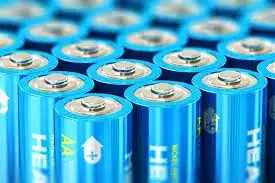
Lithium-ion technology is preferred over other battery technologies because it offers fast response times and high-cycle efficiency (low-energy loss between charging and discharging) while remaining cost-effective. The battery value chain includes mining, raw material processing, cell component production, battery cell/pack production, battery storage, electric vehicles, and recycling and reuse. The first three stages - mining, raw material processing and cell component production - account for nearly 60% of value addition.
Chinese companies dominate the global battery market with a 60% share, followed by South Korea with 22% and Japan with 8%. CATL (Contemporary Amperex Technology Co Ltd) and BYD account for 52% of global battery cell manufacturing. India's battery import bill reached USD 2.1 bn in 2023, with over 85% of imports coming from China.
Scaling up and stabilising battery cell manufacturing is critical to ensuring India's energy independence and achieving its decarbonisation goals. Leading players like Tata, Reliance, Maruti Suzuki, Amara Raja, Exide, TVS Lucas, Ola Electric and JSW have announced plans totalling 100 GWh by 2030, with investments of around USD 12-15 bn. Also, GoI is implementing a PLI scheme for 50 GWh of battery manufacturing in India.
Here's what needs to be done:
- ACC PLI: GoI has launched the advanced chemistry cell (ACC) PLI scheme with an outlay of INR 18,100 cr to support 50 GWh of battery manufacturing. However, only 30 GWh has been awarded so far. There is need for a robust monitoring and implementation framework to ensure speedy on-ground execution. New applications for batteries are rapidly emerging in heavy transport, aviation, drone tech and grid storage, requiring high-energy density and power. With various potential improvements to existing tech like lithium-ion and alternatives such as solid-state, sodium-ion, flow, aluminium-air and metal batteries in different stages of commercialisation, it's crucial to push the niche ACC programme for futuristic battery technologies.
- Mineral security: Through MSP of 14 countries, India should focus on building a resilient supply chain for critical battery minerals like cobalt, nickel, lithium and the 17 'rare earth' minerals essential for the battery value chain.
- Processing capabilities: Minerals are refined into battery-grade chemicals and components used to make anode and cathode electrodes for battery cells. The Volta Foundation estimates that the mineral processing market will reach USD 62 bn by 2030. Currently, China controls 70% of global lithium refining capacity, and 85% of anode and electrolyte production. India has a unique opportunity to position itself as a reliable supplier as the global market seeks to diversify the supply chain. India should rapidly build its mineral processing capabilities to carve out a niche in the global market.
- Battery value chain and ecosystem: The battery ecosystem offers ample opportunities across upstream, midstream and downstream segments, with extensive vertical integration and economies of scale crucial. Companies like BYD and Tesla have demonstrated how vertical integration can lead to lower prices. Indian companies should lead by forming joint ventures and acquiring suppliers to secure long-term access to input materials.
- Battery-swapping networks: Enabling battery-as-a-service (BaaS) through battery swapping could significantly reduce the cost of EVs, shorten charging times and boost adoption. R&D Universities and R&D institutes should focus on developing advanced prototypes, improving battery technology, and enhancing range and overall performance. Emphasis on R&D is critical, and the new INR 1 lakh cr scheme should be utilised to advance battery storage.
- Circular economy: Repurposing EV batteries for energy storage systems (ESS) after their end-of-life will improve the economics of second-life applications, provide low-cost commercial markets and reduce the need for new batteries in the power sector. Battery recycling units will ensure the recovery of critical minerals from end-of-life batteries and promote a circular economy by formalising the processes of battery collection, aggregation, separation, transportation and recycling.
Disclaimer: The copyright of this article belongs to the original author. Reposting this article is solely for the purpose of information dissemination and does not constitute any investment advice. If there is any infringement, please contact us immediately. We will make corrections or deletions as necessary. Thank you.





